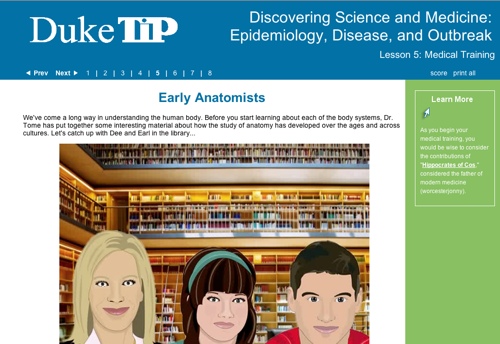The instructors and designers behind the Duke University Talent Identification Program (TIP) know a thing or two about engaging and advancing gifted students through technology. Duke TIP identifies, challenges and engages gifted and talented students through talent searches, face-to-face educational programs, independent learning courses and more. SoftChalk makes it easier for Duke TIP curriculum developers to scaffold higher-order thinking skills and facilitate an inquiry-based approach to course design. Using an interactive, online format that meets gifted students where they are, Duke TIP uses SoftChalk extensively in the development of independent study curriculum and online courses.
Discovering Science and Medicine: Epidemiology, Disease and Outbreak is one such course. This is a self-paced, independent study science course for fifth, sixth and seventh graders, grounded in an inquiry and project-based learning framework. Using video, above-level readings, and a cast of virtual scientists and classmates, students solve interdisciplinary, real-life problems related to disease outbreak. Along the way, they learn complex concepts such as the scientific process, statistics, experimental design, anatomy and epidemiology. Throughout the course, students are prompted by SoftChalk’s QuizPopper tool to show their level of mastery and assess their understanding along the way.
“It’s just a simple way to put high level questions and materials that you want students to evaluate right after content,” explains Lyn Hawks, Duke TIP’s Assistant Director for Curriculum and Instruction.
SoftChalk’s user-friendly interface allows developers to easily link to high-level, rigorous, and open-ended assessments, projects, and rubrics in PDF form, providing gifted learners differentiated options for instruction. In addition, developers can spend quality time creating powerful scripts for multimedia content (avatars and live-actor video) to embed on any page and prompt students to feel part of a larger narrative and community.

The course culminates in a medical mystery, a project which requires students to help their virtual classmates determine the causes of an infectious disease outbreak at the state fair. With SoftChalk, curriculum developer Timothy Byington designed a lesson that included multimedia content, assessments, and text that drives students from clue to clue. This requires a complex web of links, with multiple pathways and possibilities.
“We were able to use the navigation down through three or four different paths based on what students chose,” explains Lyn. “We could do the necessary bookmarking with SoftChalk really easily.”
These complex projects were more difficult to deliver when Duke TIP first started its independent learning program as a classic correspondence course in the 1980s. Over the years, they shifted from CD-ROM to online learning, and while Duke TIP continues to offer certain courses in workbook formats, they now release courses in online formats using SoftChalk’s platform and the Duke TIP website. Technology adopted must work within a nonprofit’s budget and developers’ limited and high-demand time, while delivering rich learning experiences that challenge gifted learners.
“Technology is only as smart as the person using it,” says Lyn. “SoftChalk allows teachers to use their brain power on lesson planning, not struggling with how to sleuth out technical aspects of instructional technology.”
For more information on how Lyn and the staff at Duke TIP make the most of SoftChalk, view the recorded Innovators Webinar on “Bloom’s Taxonomy, Thinking Skills and SoftChalk”.
